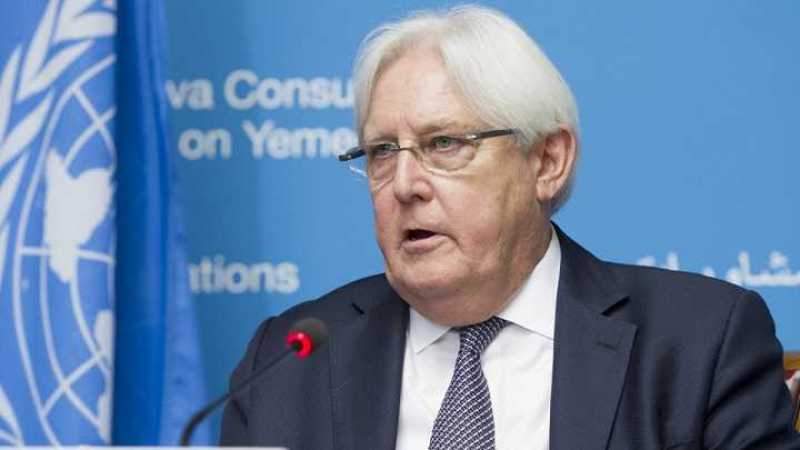Expenditures Without Limits and a Task Without an End: UN Envoy to Yemen
YemenExtra
The UN envoy to Yemen, Martin Griffith, did not present anything new in his recent testimony before the Security Council for it was similar to his previous statements during the past two years since he took office.
However, what is new this time is the uncovering of the huge expenses spent for this envoy’s office that exceeded the expenses of the UN mission to Syria.
Activists on social media circulated documents regarding the budget of the UN envoy in Yemen, which amounted to $ 17 million in 2019, and will rise this year to 18 million, exceeding the amount allocated to the UN mission in Syria, which amounted to $ 16 million. Moreover, the number of the Griffith Mission’s employees reached 95 last year and will rise to 101 during this year, most of them are considered international staff, while aviation-related expenses reached about $1.3 million annually.
As for the UN mission in Al Hudaydah, its budget exceeded $ 56 million last year at a monthly rate of between $ 2.4 – $ 4.6 million, with a number of 138 employees in 2019, which will increase to 159 in 2020, and the ship’s rent for the Hodeidah mission reached $ 810,000 per month. The mission has also rented Four Seasons Hotel with $ 3 million, villas amounting to 1.8 million, villas affiliated with the World Food Program and accommodations in Sana’a reaching half a million dollars.
The approximate number of expenses of the Griffith and Hodeidah mission exceed 44 billion and a half billion Yemeni riyals, which is considered more than half of the total salaries given to Yemeni government employees estimated at 75 billion riyals per month.
However and in two years, such immense expenses did not have such major impact on the political process. The only achievement Griffith has fulfilled is the Sweden agreement in December 2018.
On the other hand, Yemenis army forces withdrew from the ports of Hodeidah and opened a bank account to receive port revenues in order to cover employee salaries. In return, the United Nations did not implement its obligations to move the inspection mechanism from Djibouti to Hodeidah and did not obligate the Saudi American aggression forces to lift the blockade and stop the detention of food and fuel ships, not to mention their fake obligation to stop breaching the ceasefire, which has reached 31 thousand violations until last December, leaving 656 between killed and injured, including 175 martyrs; 63 children and 27 women, according to official statistics.
“While our forces committed to implementing the Stockholm Agreement and we presented unilateral implementation steps such as redeployment in the ports of Hodeidah, stabilizing the ceasefire, maintaining aid flows, and other steps, the aggression forces and their mercenaries are still delaying the implementation,” said Yemeni Armed Forces spokesman Brigadier Yahya Sari`.
The aggression and its mercenaries continue to blockade the city of Addraihmi and prevent the arrival of food and medicine to the citizens who are trapped for nearly a year, which confirms their lack of honesty in implementing the agreement.
In general, it clearly appears that the aggression forces were satisfied with the work of Griffith since they increased the mission’s allocations as it follows the aggression’s desire to protect Marib as a base for the Saudi invading forces, close to the sources of wealth.
Earlier this month, the envoy met their commander in Marib; the governorate that the Saudi-led coalition desires to keep a safe haven for recruiting mercenaries to fight under the command of Saudi forces against the Yemeni armed forces.
To further explain, it appears that the Griffith mission is seeking to stabilize the military field situation as it is in preparation for the implementation of the project to divide Yemen into six regions and this appeared through the “deep concern’ expressed by Griffiths about the victories of the army and the popular committees in Marib and Al-Jawf during his briefing, Thursday, before the Security Council. Such concern is very similar to Britain’s concern when it issued a statement of condemnation at the end of January after the Yemeni Armed Forces liberated Nehm district from invaders and mercenaries. Meanwhile, Britain stood there in silence and ignored all the crimes of aggression and operations against the Yemeni people for five years.
If there is really an honest intention to solve the Yemeni political file then the keys of the problem consist of, as stated by the head of the national negotiating delegation, Mohamed Abdel Salam, “first to stop the aggression and lifting the siege. Then conducting serious political negotiations would take place,” stressing that “any fabricated calls to solve the crisis are actually subtle calls to prolong the aggression and the siege.”
In addition, Abdel Salam called on “the UN envoy to distance himself from the suspicious agenda because the road to political consultations requires halting the aggression and lifting the blockade.”
Apparently, Griffith could not care less about this call as long as his allocations are on the rise since his last briefing came in the context of prolonging the conflict.

